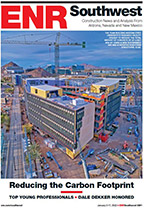The State Transportation Commission recently presented Colorado Dept. of Transportation (CDOT) Maintenance Section 3 staff with the department’s 2012 Environmental Award.
Maintenance Section 3, headquartered in Durango and covering six counties in southwest Colorado, received one of just three awards given. Section 3 crews won for their in-house production of a salt brine as a liquid deicer.
“Traditionally, CDOT uses magnesium chloride as the base product for snow and ice operations,” CDOT Section 3 Maintenance Superintendent Kyle Lester said. “We began experimenting with the use of salt brine as a liquid deicer in 2006 in an effort to reduce the concentration of chlorides that are introduced into the environment.”
In 2009, maintenance section staff developed their own brine-making system that produces 24,000 gallons in just four hours. This salt brine production process continued to evolve with the integration of a wastewater recycling system. In 2010, staff developed an automated salt-brine production system that recycles wastewater from the maintenance patrol barn floor drains and wash bay. The recycled water is filtered for heavy metals and other contaminates, then mixed into the salt brine.
Eventually, the system at all maintenance areas will be fully computerized and fully automated. Operators will load a circular hopper (conveyer) with salt, and sensors on the mixing tank will monitor the solid salt level and the salinity of the brine.
The environmental and economic benefits of the use of salt brine as a liquid deicer are:
• It cuts the number of chlorides introduced into the environment in half compared to magnesium chloride.
• Cortez and Ridgway production facilities recycle their wastewater by filtering out the heavy metals; after the metals are filtered, the clean water is then pumped to storage tanks where it is made into salt brine
• Salt brine is less expensive than magnesium chloride products, saving $394,030.
• Salt brine is quicker to produce onsite than having liquid deicers delivered; crews can produce 24,000 gallons in an eight-hour shift.

